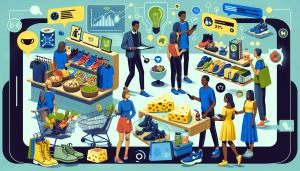 UseCasesFor.ai
UseCasesFor.ai
Choose Topic
 UseCasesFor.ai
UseCasesFor.ai
AI Use Cases
A collection of over 250 uses for artificial intelligence
A continually updated list exploring how different types of AI are used across various industries and AI disciplines,including generative AI use cases, banking AI use cases, AI use cases in healthcare, AI use cases in government, AI use cases in insurance, and more

Sign up
to receive a PDF containing all the use cases and stay updated with the latest AI trends and news (you can always unsubscribe)
Recommending products

Introduction
The retail industry is among the most innovative industries across the globe as it is characterized by the frequent evolution and development. This industry has also been transformed by digital technologies such as Machine Learning (ML) and Artificial Intelligence (AI). These technologies have not only increased the efficiency of the operations but have also enhanced the experience of the customers. Among the many applications of AI and ML in the current business environment, one of the most effective is in the area of retail, particularly in product recommendations. This entails the analysis of vast amounts of data to make recommendations on the products that the customers may be interested in buying. It is a powerful instrument that has a straight impact on the sales, satisfaction, and loyalty of the customers.
Challenges
However, there are some challenges that come with the integration of AI and ML in product recommendation systems and this includes the challenge of managing large data sets that are needed for analysis. Other challenges include data privacy and security since retailers have to meet the requirements of data protection laws. Also, since the customer behavior is constantly evolving, these systems need to be fine tuned on a regular basis to provide relevant recommendations. In addition, there is the issue of how best to incorporate AI and ML into current systems. Also, there is the problem of proving how these technologies will generate tangible returns on investment and this is a critical factor for organizations particularly for the purpose of justification and approval of funds for the project.
AI Solutions
There are, however, a number of difficulties that can be encountered when it comes to the application of AI and ML in product recommendations. However, the following benefits can be obtained from the use of AI and ML to address data handling and analysis challenges: These technologies include the use of algorithms that are capable of analyzing large data sets within the shortest time Inferred. Customer behaviour can also be analyzed and predicted through the use of AI and ML thus enhancing the accuracy of product recommendations. There is an option of using Natural Language Processing (NLP) in analyzing customer reviews and feedbacks in order to gain better understanding of the customer. In addition, AI and ML can easily be incorporated with other IT systems through Application Programming Interfaces (APIs) hence causing little or no disturbance. Last but not the least, sophisticated AI strategies can also ensure data privacy and security for instance through the use of encryption and data anonymization.
Benefits
There are many ways through which AI and ML can be useful in the retail sector especially in the area of product recommendations. It can assist in boosting sales through suggesting products that customers may need. It also has the potential of improving customer satisfaction and loyalty through offering personalized service. In addition, it can assist the retailers to analyze customer behavior to come up with some strategic decisions. Also, AI and ML can personalize the process of data analysis which makes it easier and less costly. Lastly, they can also assist in the management of data privacy and security.
Return on Investment
The yield that can be obtained from the application of Artificial Intelligence and Machine Learning in product recommendations can be quite high. A research done by Boston Consulting Group showed that, retailers that embrace personalization strategies boost their sales by 6-10%, which is two to three times the rate of other retailers. Also, the application of these technologies can also help reduce costs as they automate the data processing and analysis thus minimizing the need for manual handling. In addition, the improvement in the customer satisfaction and loyalty can greatly enhance the revenue generation in the long run. However, the ROI can be different based on certain factors such as the extent of deployment, the effectiveness of the AI and ML algorithms, and the type of business model used by the retailer.